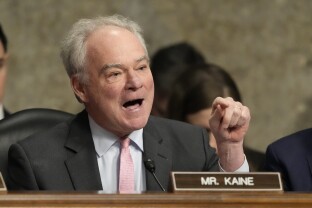With one day left before a government shutdown, Senate Democrats are starting to name their price for supporting a GOP government funding bill: a vote on a short-term extension.
One scenario in particular is gathering legislative momentum: Republicans give Democrats a vote on a 30-day continuing resolution — likely as an amendment to the GOP bill, which would fund the government through Sept. 30 — the amendment fails, and then a handful of Democrats join Republicans to support advancing the larger GOP funding bill.
“If they want to vote on that in exchange for getting us the votes to pass to Sept. 30, I think we’re open to that,” Senate Majority Leader John Thune told reporters Thursday morning. “But as you all know, the House is gone. So whatever happens is going to have to be the final action.”
While Democrats have presented strong opposition to the Republican funding bill — Senate Minority Leader Chuck Schumer said Wednesday that Democrats were “unified” in their opposition and that there aren’t enough votes for the Republican plan — the opposition is softening.
Democratic Sen. Tim Kaine, who told reporters earlier in the week that he was a “hell no” on the GOP bill, said on Thursday that, “If we get some of the amendments, yes, I will vote for cloture.”
“There’s other amendments that folks are discussing that I’d like to get votes on, but the 30-day CR is the most important,” Kaine said.
Kaine said he would not support final passage of the House bill, but he wouldn’t have to. Republicans simply need Democrats to support cloture to clear the 60-vote threshold of the filibuster.
Other potential votes for the Republican funding plan have been less forthcoming about their intentions. A number of Senate Democrats remain publicly undecided about supporting cloture on the six-and-a-half month funding bill, even if they are guaranteed an amendment vote on their preferred short-term option.
“I just haven’t thought through it yet,” Sen. Elissa Slotkin told NOTUS. “Sorry.”
Some stuck to the same vague answers they’ve been delivering all week — Sen. Jacky Rosen told NOTUS that she would “review all of our options” — or promised to oppose any procedural vote, regardless of what amendments are offered.
“Would I vote for a procedural for the CR? No,” Sen. Andy Kim told reporters.
Thune and Senate Majority Whip John Barrasso said they haven’t heard from Democratic leadership on the pitch just yet. Thune said Thursday that it was “their call” on whether they wanted to play ball. Republicans, he added, were “waiting for them to decide what they want to do.”
Amendment votes to the bill seem inevitable already, given that Sen. Rand Paul — the lone Republican hold out on the bill — said he would only support speeding up a final vote if he was given a vote on his own amendment, which would codify cuts by the Department of Government Efficiency. Barrasso on Thursday said he’s not heard anything yet on whether additional Republicans or Democrats have specific amendment demands.
Still, the Senate is running out of time. The focus remains on what Schumer’s caucus will do should leadership come to an eventual agreement. Whatever Paul’s position, Republicans will need several Democrats — at least seven, if Paul supports cloture — to support a procedural vote to end debate to get a final up-or-down on the funding bill.
Whether that happens — and whether there are enough Democratic votes to support cloture — remains to be seen. Even though some Democrats are clearly softening, Schumer has maintained that Democrats are prepared to shut down the government rather than vote for the GOP funding bill.
If no agreement is reached to move the vote forward, the bill will not pass before the Friday funding deadline. There will be a procedural vote Friday morning that requires 60 votes to pass, which will be the first hurdle for Democrats to clear if they want to prove they’re serious about shutting down the government.
So far, only one Democrat — Sen. John Fetterman — has said he would vote for the House funding bill. Two potential swing votes — Sens. John Hickenlooper and Mark Warner — said on Wednesday that they would not support the bill.
The Senate was set to go on recess next week, the first it will have had all year, but Republican leaders warned that they’re ready to tee up additional votes next week if a shutdown comes.
“We’re just going to stay here and continue to confirm President Trump’s nominees,” Barrasso said, noting Thune has filed cloture on additional nominees.
If a shutdown does happen, getting out will be no easy feat. Democrats would have to come up with another set of demands, or simply hope for Republicans to cave on a short-term extension to allow lawmakers to negotiate on a broader deal.
Meanwhile, Republicans think they have leverage after the House passed a funding bill and it would be Democrats blocking the legislation.
“To get out of a shutdown, they’re going to have to come up with a solution that they’re going to be responsible for,” Barrasso said of Democrats.
—
Ben T.N. Mause is a NOTUS reporter and an Allbritton Journalism Institute fellow.
Ursula Perano is a reporter at NOTUS.
Sign in
Log into your free account with your email. Don’t have one?
Check your email for a one-time code.
We sent a 4-digit code to . Enter the pin to confirm your account.
New code will be available in 1:00
Let’s try this again.
We encountered an error with the passcode sent to . Please reenter your email.


